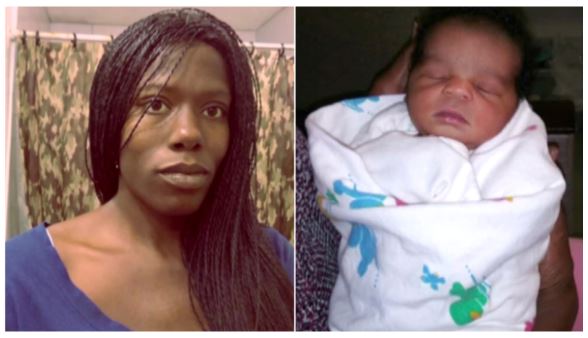
Tammy Jackson & baby (photo: Change.org petition)
The Women’s Law Project has joined more than 50 organizations in formally demanding accountability from authorities in Broward County, Florida where Tammy Jackson, 34-year-old mentally ill and incarcerated woman, was recently forced to give birth without medical assistance alone in an otherwise empty prison cell.
You can read the open letter and petition authored by the Pro Choice Coalition of Broward County here. There is also a Change.org petition anyone can sign here.
We are joining our allies in calling for full cooperation and support from Broward County Sheriff’s Office, Broward County Commission, Florida State Legislators representing Broward County, Governor Ron DeSantis, U.S. Legislators representing Broward County to meet the demands outlined herein to determine accountability, document deficiencies and implement changes, as needed, ensuring that no person detained in a Broward County facility experiences a situation like that endured by Ms. Jackson.
Here is more information about the case from the Washington Post:
According to a letter dated May 3, written by Broward County public defender Howard Finkelstein, the full-term 34-year-old with a mental illness began complaining to officers about contractions around 3 a.m., April 10, the Miami Herald first reported.
More than four hours later, members of the sheriff’s office spoke to the on-call doctor, who said “he would check when he arrived,” according to Finkelstein. And when the physician clocked in, he did.
That was around 10 a.m.
For the seven preceding hours, Jackson was locked in a jail cell, alone. She was bleeding, in labor, and then forced to birth her baby on her own — conduct which Finkelstein called “outrageous” and “inhumane” treatment.
According to the Pro Choice Coalition of Broward County, Ms. Jackson was arrested in late March for drug possession and other misdemeanor charges and was being held at North Broward Bureau, a minimum to medium security jail in Pompano Beach, Florida that houses “mentally ill, medically infirm and special needs” inmates among its 1,200 person population.
Instead, Ms. Jackson was left to endure labor in isolation without medical assistance for seven hours.
“This case epitomizes why policymakers and correctional staff need to prioritize incarcerated women’s issues in their policies and training. Incarcerated women face challenges that incarcerated men may not, and may face dire health risks in the absence of specialized pregnancy and postpartum care,” says Women’s Law Project attorney Margaret Zhang. “Together with the Philadelphia-area Incarcerated Women’s Working Group, we at the Women’s Law Project are seeking to ensure that correctional facilities in Pennsylvania take steps to ensure that cases like Ms. Jackson’s do not occur here in Pennsylvania.”
Dignity for Incarcerated Women in Pennsylvania
In March, John Hopkins Medicine published the first-ever study of pregnant women in U.S. prisons found almost 1,400 pregnant women were admitted to 22 U.S. state and all federal prisons in a recent year. Researchers noted that historically, these numbers have not been even tracked by U.S. federal agencies or state prison systems despite the fact that most women in American prisons are of reproductive age.
Here in Pennsylvania, we are supporting the Dignity for Incarcerated Women legislative package, a group of bills designed to address the crisis created by arresting and imprisoning more women of reproductive age—the number of imprisoned women and girls in the United States has increased 700% since 1980—while failing to establish humane and ethical standards for reproductive healthcare and pregnancy.
Pennsylvania’s Dignity for Incarcerated Women package was proposed and developed by the Pennsylvania Legislative Black Caucus.
“It was a real opportunity to just come together to raise our voices and make sure this criminal justice reform conversation doesn’t leave behind — but specifically recognizes — the uniqueness of when women are in our prison system,” Rep. Morgan Cephas, chair of the women and girls subcommittee for the Legislative Black Caucus, recently told WHYY.
The Dignity for Incarcerated Women package includes legislation that includes alternative sentencing for pregnant women; the provision of menstruation products; prohibiting solitary confinement, and providing one free phone call and email to children, among other initiatives.
The Women’s Law Project is a public interest law center devoted to defending and expanding the rights of women, girls, and LGBTQ people in Pennsylvania and beyond.
Sign up for WLP’s Action Alerts. Stay up to date on issues and policy by following us on twitter and liking us on Facebook.
We are a non-profit organization. Please consider supporting equal rights for women and girls by making a one-time donation or scheduling a monthly contribution.

